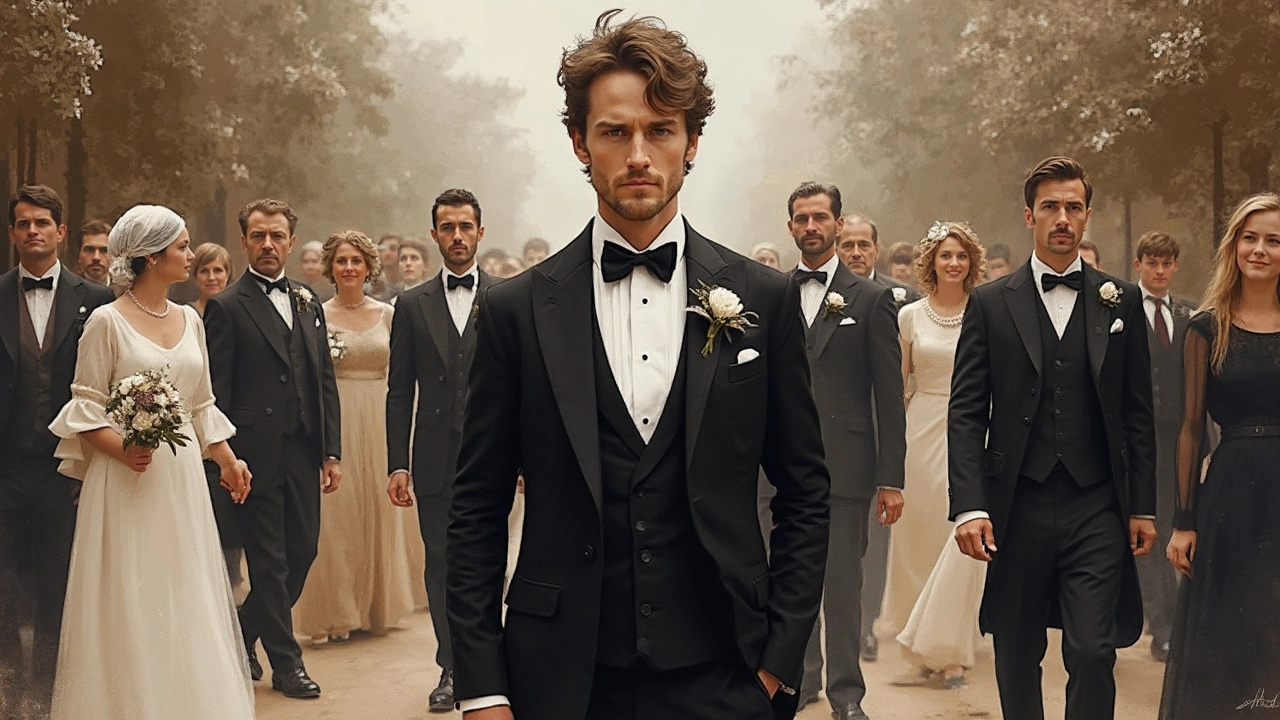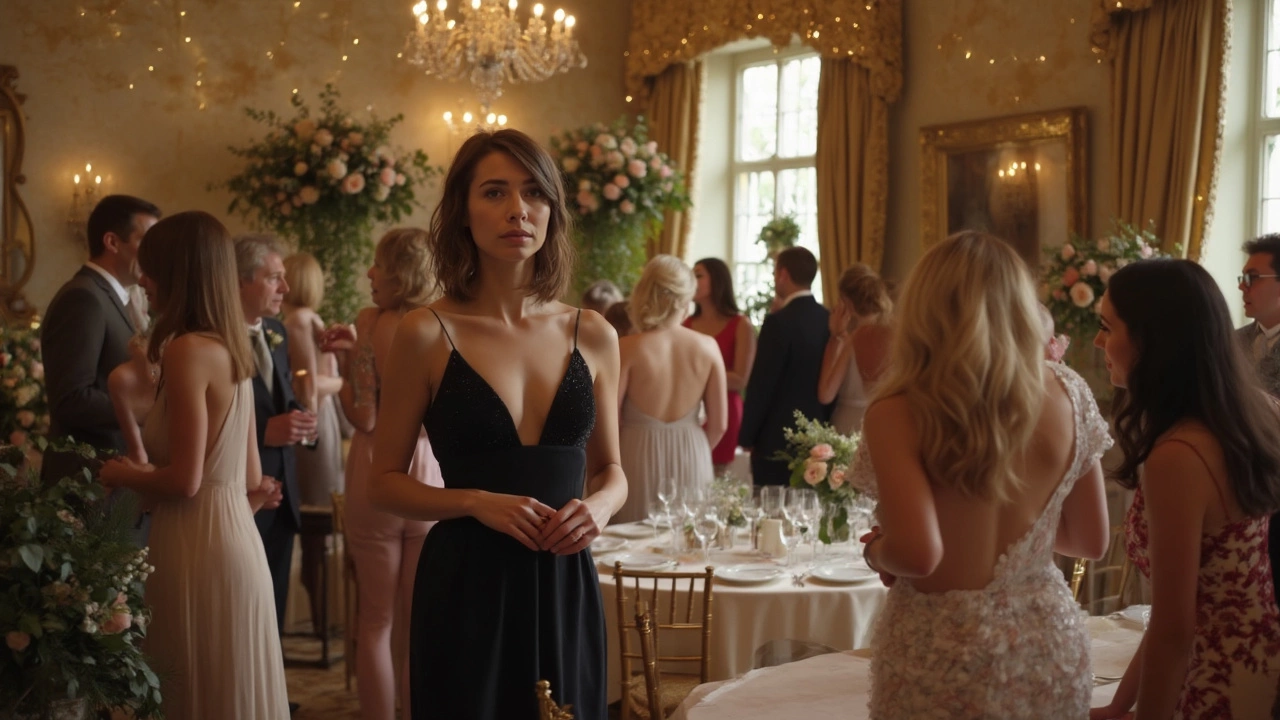Someone walks into a wedding in a sleek black dress or suit. Heads turn, whispers start, and eyes linger for just a moment longer than usual. You can almost hear the silent question floating in the air: isn’t black supposed to be bad luck at a wedding? Or maybe it’s actually the hottest trend, and they’re pulling it off flawlessly? The truth is, when it comes to the question, “What does black mean at a wedding?” the answer is a lot more complicated—and a lot more interesting—than just ‘good’ or ‘bad’ manners.
The Symbolism of Black: Not Just for Funerals Anymore
Black has always been a color that carries a lot of emotional baggage. To a lot of people, black can mean sophistication, class, and strength—that little black dress or tailored tux is still a fashion icon. At the same time, black gets typecast as a color of mourning, mystery, and in some cultures, even rebellion. For centuries across North America and Europe, wearing black to a wedding was a firm no because black signaled mourning and grief. The fear was that you’d be showing up like a raincloud at someone’s brightest day—a superstition with real roots. In Victorian England, widows wore mourning dresses for years after a funeral, and black in celebration was seen as inappropriate.
But times change. Black has become the go-to color for evening wear, and you’ll find black gracing the covers of fashion magazines, runways in Milan, and, yes, even high-society weddings. According to data from The Knot’s 2024 Wedding Attire Trends survey, nearly 41% of weddings in urban areas had guests wearing black dresses or suits. This is nearly double the rate from ten years ago. So what happened? The world got less superstitious and more practical. Black is elegant, slimming, and doesn’t compete with the bride. And with wedding parties becoming more about style and personal expression, the old rules just don’t stick the same way.
But let’s not forget: context still matters. In some cultures, black remains a color of mourning and is reserved for funerals. For example, some Italian and Spanish weddings still frown on black attire. But in Chinese culture, white is actually the color associated with funerals, not black. In fact, black can symbolize wealth and stability—so if you’re attending an East Asian wedding, don’t stress over that black cocktail dress. The point is, the cultural meaning of black at a wedding is completely shaped by where and with whom you’re celebrating.
Here’s a quick look at the symbolism of black at weddings across a few cultures:
| Culture | Black at Weddings |
|---|---|
| American/Canadian | Recently accepted, elegant, but check with the couple |
| British | Traditionally taboo, now common in urban weddings |
| Italian | Can still be seen as disrespectful, especially by older generations |
| Chinese | Not problematic; white means mourning instead |
| Indian | Considered unlucky, usually avoided |
| Jewish | Fine if the wedding isn’t on the Sabbath; respect local customs |
If you want to play it safe, just ask the couple what they prefer. Most appreciate you showing you care to check.
Black Outfits: Old-School Taboos vs. Modern Acceptance
Flash back a generation and black at weddings would have been met with raised eyebrows or worse. My own grandmother wore a navy blue suit to every wedding—black was strictly off-limits unless you had recently lost someone close. Guests were expected to represent joy, and wearing what looked like “mourning clothes” was considered downright disrespectful. Magazines in the 1950s warned women that wearing black or red was a “wedding faux pas.” You were expected to blend in, look pretty, and let the bride shine. Splashy pastels, florals, pale blues, and yes, beige, ruled the guest list.
But as weddings got less buttoned-up, the rules changed. It all started in the 1980s and 90s when celebrities began bending the etiquette rules. When Carolyn Bessette married John F. Kennedy Jr., her famously minimalist, modern look—with guests in black dresses and black-tie tuxedos—became iconic. Soon enough, black-tie and formal weddings took black out of the “no go” zone and turned it into a badge of cool. Nowadays, influencers on Instagram and Pinterest share wedding looks styled around black. Hashtags like #blackdresswedding get millions of views, and bridal magazines feature black gowns as the bold alternative to the classic white wedding dress.
Modern etiquette experts—including Lizzie Post, Emily Post’s great-great-granddaughter—say there’s no rule against black anymore, as long as it fits the formality of the wedding and doesn’t upstage the couple. Black is basically the new neutral. The only things that can trip you up? The type of wedding (is it an afternoon garden party or a black-tie city bash?), the wishes of the couple, and any cultural or religious traditions that apply. Always check the invitation: if it says "formal" or "black tie," black is perfect. If the vibe is "beach casual" or "farmhouse chic," you might want to switch it up.
Let’s talk numbers for a minute. According to a 2023 Brides.com poll, over 65% of surveyed couples said they don’t care if guests wear black. Only 9% said they preferred guests not wear black, and most of those gave "superstition" or "family tradition" as reasons. Compare this to just 20 years ago, and you can see the shift in attitudes. There’s freedom, but also a little more responsibility to read the room.

Guest Tips: When (and How) to Wear Black at a Wedding
Thinking of wearing black? Here are some tips on pulling it off so you look chic instead of out-of-place or, worse, disrespectful.
- Check the Invite: Look for clues. Is it a formal or evening wedding? Black fits right in. If it’s a summer daytime wedding outdoors, you might want to go for lighter shades. Some invites state the couple’s color theme—avoid matching the wedding party unless you’ve been asked to.
- Think Fabric and Style: Light, flowy fabrics make black look softer in daylight or summer. Satin, velvet, or wool looks better for fall and winter evening weddings. Try dresses with floral embroidery, sparkly accents, or interesting silhouettes to soften the look of all-black.
- Accessorize with Care: Don’t mistake black for boring. Pair your black dress with statement jewelry, bright shoes, or a bold clutch. Metallics and gemstones lift the look so you don’t blend into the background. Pearls add a nice traditional touch.
- Respect Cultural Traditions: If it’s an Indian or Middle Eastern wedding, steer clear of black unless you know the family is cool with it. In those cultures, black often means bad luck. When in doubt, ask a family member or opt for something more colorful.
- Read the Room: Sometimes black can make a statement for the wrong reasons. If you know the couple or their families are very traditional, you might want to save black for a night out instead.
- Don’t Upstage the Bride/Groom: Be sure your black outfit isn’t too dramatic—no sequined ballgowns or slinky floor-length dresses unless the event is ultra-formal. You want to look good, not grab all the attention.
- Own It: If black feels right, wear it with confidence. The best outfit is the one you feel amazing in. That confidence is what people remember, not the color itself.
A couple real-life tips: A friend of mine wore a black jumpsuit with big gold earrings and a pink clutch to a city loft wedding. She looked modern and fun, and nobody batted an eye. At a vineyard wedding last fall, guests in black with sunflower corsages tied everything together. It’s all about the occasion and how you wear it.
Black for the Couple: Wedding Dresses, Suits, and Taupe Traditions
You’ve probably seen bold brides in all-black dresses lighting up your Instagram feed. Ten years ago, black wedding dresses were considered edgy. Now, designers like Vera Wang and Sarah Seven release entire collections in rich, dramatic shades of black, navy, and even deep emerald. In one 2023 Vogue Weddings interview, Vera Wang said, “Black has always meant sophisticated, mysterious, and rebellious—everything a modern bride can be, too.”
For grooms and non-binary partners, black suits and tuxedos are timeless. They’re the standard for black-tie celebrations, but couples are mixing it up with velvet jackets, metallic lapels, and colored shoes. Wearing black can be a statement of individuality. It might mean breaking free from stuffy gender norms, showing off a gothic style, or just looking cool in a sea of beige and blush. At Halloween or gothic-inspired weddings, black is often the dominant color for the entire bridal party.
The options for wedding dresses in black range from classic A-line to full ball gown—sometimes with white lace overlays or pops of colored embroidery. Black wedding attire isn’t exclusive to Western weddings, either. In Nigeria, for instance, fashion-forward brides and grooms might choose black agbada or aso-ebi styles as a nod to both luxury and rebellion against the norm. Brides wearing black symbolically reject the idea that “pure” and “innocent” have to be tied to a dress color—or anything else. They also tend to choose black as a “power look” that aligns with their own sense of style. Wedding blogs buzz over brides who carried bouquets of burgundy calla lilies and wore black velvet heels; meanwhile, guests gushed about how the bride’s personality came through, rather than how well she matched the linens.
But even with this shift, some caution is smart. If you’re the couple thinking about going non-traditional with your look, give older relatives a heads-up. Some might freak out a bit but will usually come around when they see how gorgeous and happy you look. It can help to pair the black outfit with classic wedding touches, like a white veil, lace gloves, or a traditional bouquet. You get the best of both worlds: dramatic fashion and a nod to tradition.
To sum it up, black at weddings is a style choice loaded with meaning, but it’s less taboo than ever. Knowing the context, respecting traditions, and expressing your unique taste is what really counts—black just sets the perfect stage.

